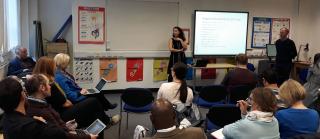The University of Glasgow School of Education (@UofGEducation) was thrilled to present the CR&DALL seminar by Professor Brian Findsen, (University of Waikato, New Zealand), entitled ‘Learning in later life: characteristics, issues, exemplars and benefits’ on October 16th, 2018.
This seminar, to a packed room (of staff, Phd researchers and Masters students), explored the character of learning in later life from varied perspectives, beginning with participant dialogue in small groups around central later life learning themes, including inclusion, culture and lifelong participation. Guided through the work of Brian with indigenous and community groups, we collaboratively features of learning in later life, critical issues for stakeholders ‘looming beneath the surface’, and shared exemplars of practice in this field in an international context, including song, sports, cooking and knowledge exchange with, and in the spirit of, the University of the Third Age (U3A).
Social and health benefits of learning in later life were debated, using evidence from different cultural and learning contexts. The session ended with an open Q&A space for Phd researchers, and was particularly of interest to those embarking on research careers with adult learners, and older adult learners (such as Kristin Huie, conducting her Phd work with Food Train and the Eat Well Age Well Project). Adult learners were able to explore their own experiences of exclusion and marginalisation within their home and host countries, as well discuss future pathways for more inclusive adult learning practices (in times of dwindling resources). A masters’ student attendee from my Psychology of Adult Learning course (Fiona Dorchester), commented:
I found it hugely refreshing to hear an academic speak about adult learning in all its manifestations. Too often, I feel that the focus is on higher education to the exclusion of anything less. Since my own area of interest leans toward informal, and non-standard learning, I was really interested in the work that Brian has done with Age Concern and the university of the third age. I got the impression that he valued learning for the sake of learning, whether that learning involved post graduate dentistry, or feather-cloak making. My poor dad has dementia (it’s a horrible condition) so I was interested in the benefits of later life learning, in keeping the brain active and engaged, and the overall sense of well-being that Brian spoke about in connection with U3A, the men’s shed movement, and the Age Concern project in Hamilton.
This thought-provoking seminar ran well over time, and Brian fielded diverse questions from methodologies to policies using examples from local and international work. It was a fantastically engaging event, and the debates have continued onto our online forums (#lifelonglearning, #lifewidelearning, #laterlifelearning).
Professor Brian Findsen has worked in the field of adult and continuing education for over 30 years, primarily in his home country of New Zealand but also in Glasgow, Scotland, from 2004-2008. He completed his doctorate in adult education at North Carolina State University in the USA. He is currently a professor of (adult) education in the Faculty of Education, University of Waikato, New Zealand.
Organiser/ Author: Dr. Catherine M. Lido is a Social Psychologist in the School of Education, University of Glasgow, with more than 13 years' experience lecturing and researching the Psychology of Human Diversity. She spent three years as a researcher at the Urban Big Data Centre, focusing on educational inclusion in the city.
Nike air jordan Sneakers | Air Jordan Sneakers
- Log in to post comments














Latest Comments